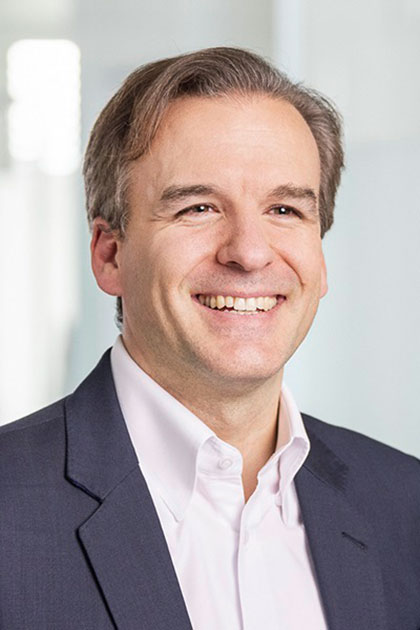Feeling Good at Work
How times have changed. Some 100 years ago, sociologist Max Weber put forward the idea that emotions have no place in the workplace. In the industrial age, work needed to be efficient, especially in manufacturing. “The predominant metaphor was to portray humans as machines,” says UZH economist Jochen Menges. Even at the time, both ideas – the metaphor and Weber’s assumption that emotions can be separated from work – are more than likely to have been ill-advised. “People who aren’t allowed to have emotions at work still have them – and they then tend to be negative.” The monotonous work, dictated by the rhythm of machines, was unhealthy and unsatisfying. Having since moved into the post-industrial era, our work and the requirements placed on the workforce have fundamentally changed in many places. Our knowledge-based society is all about generating new ideas and developing innovation products, and this requires creativity and cognitive skills. Studies have shown that Weber’s call for rationality in the workplace is of little use here. “People share certain feelings when they work. These can be helpful, or they can be an obstacle,” says Jochen Menges. We’ve all been in teams in which we feel at ease and are productive, and most of us are also likely to have experienced teams where we’ve struggled to make headway.
Mutual trust
Researchers have found that we perform better when (positive) emotions are at play. “Teams that have a generally positive atmosphere are much more efficient,” says the UZH economist, “because people can focus on their tasks – rather than figuring out who they can or can’t trust, or who is or isn’t doing their job.” Jochen Menges’ research focuses on emotions at work. “When it comes to people working together in teams, one of the key scientific findings is that their actions and thinking are often driven by their feelings,” says the professor. And this insight is now also being acknowledged by the industry. According to a 2021 survey carried out by Menges and his team among 122 businesses with over 3 million employees, close to 70 percent of managers believe that a positive atmosphere increases a team’s productivity and performance.
This clear result came as a surprise to the economist, because for a long time, the main reason businesses cared about their employees’ emotions was because they believed positive feelings would help the staff stay healthy and remain loyal to the company. In this study, however, health came second, behind productivity and performance, while creativity and innovation were ranked third highest, followed by loyalty. In other words, many companies have realized that emotions and performance are linked. Some tech companies, for example, now offer free meals, yoga lessons, table football or even slides in their offices to make the workplace more appealing to employees. Menges thinks that’s a good start, but despite such perks, the actual work essentially stays the same. The UZH economist therefore believes that we need to rethink and improve the work itself – and has come up with an innovative approach to do so.

People who aren’t allowed to have emotions at work still have them – and they then tend to be negative.
Proud, confident or happy?
Jochen Menges’ new approach is no longer to focus on how employees are feeling but on how they want to feel. One of the first noteworthy insights of this research is that there is not one single emotion which everyone wants to feel, but many – such as appreciated, proud, challenged, confident, satisfied, inspired, happy or relaxed. “That is, there aren’t one or two emotions that everyone would like to have when they’re working. People differ in how they want to feel at work,” Menges explains.
In a recent study conducted together with Florence Bernays and Lauren Howe, he listed 20 key emotions and surveyed over 18,000 people across 35 countries. They found that not only are there differences within countries, there are also differences between countries. For example, in the US the most frequently named emotional adjective was “proud”, while in Japan it was “challenged”. A majority of Chinese respondents, in contrast, said they want to feel “competent”, while employees in other countries wish to feel “satisfied” (Switzerland and Germany) or “confident” (India).
The idea that employees can experience their desired emotions regularly at work was dubbed the “emotional fit” by Menges. Put differently, our work should match the emotions we want to experience – and this makes us happy, the study shows. In countries where employees experience the desired feelings at work more often, people are less likely to engage in self-destructive behavior, such as alcohol abuse. The fact that people differ in the emotions they want to experience at work is a great challenge for teams and businesses. “If some people want to feel proud at work while others prefer to feel relaxed, they’re pursuing very different goals,” says Jochen Menges.
What teams want
Since the study shows that it’s highly unlikely that all members of a team will want the same emotions, the question is: how can these differing needs be reconciled? According to Menges, the solution is to let the other team members know what kind of emotion you’re looking for. Once this is out in the open, the team can agree on how they want to feel and decide together how their work can be organized in a way that meets everyone’s emotional expectations. To achieve this goal, Jochen Menges uses an emotional charter, which may sound a bit far out but is backed by solid research.
Jochen Menges and Jennifer L. Sparr, a member of his team, recently completed the Future of Work@UZH pilot project on mobile working at the university. The aim of the project was to develop models that teams can use to successfully shape their everyday work at UZH, with people working from home as well as on site. The project involved asking participants how they wanted to feel at work, and then having them work together as a team to find ways of organizing their work to make the different feelings possible.
A key element of this process is that solutions are discussed and developed by the team members themselves rather than imposed from above. A study conducted by Menges among some 24,000 participants across 161 businesses pointed toward two key things that can help improve people’s feelings at work. The first is to have decentralized processes. This means decisions are made by those who are working together on a project rather than by distant managers in the C-suite. It gives employees more responsibility for their emotions, as well as the means to shape them. “This may also be one of the reasons why Switzerland ranks so highly in happiness surveys, because it has a decentralized federal structure and people can have their say,” says Menges. “But most companies aren’t organized this way.”
The second point that can improve the work environment concerns the employees’ emotional skills and managing human resources in a way that is geared toward emotions. These aspects need to be given more weight, states Menges. The goal is for companies to become “emotionally intelligent”, which also has implications when it comes to education. After all, if emotional intelligence is becoming more and more important in the working world of the future, this means that students also increasingly need to acquire the relevant skills. The better we feel at work, the more productive we’ll be and the greater the success our teams and companies will enjoy, the UZH professor believes.
